Artificial intelligence promises to transform both the HR function and the future of work.
Both CEOs and employees agree that AI will transform the workplace, but recent IBM studies have revealed that few feel prepared to take advantage of AI’s potential:
• In the next three years, 120 million workers in the world’s 10 largest economies will need to be retrained and re-skilled as a result of AI and intelligent automation.
• While two-thirds of CEOs say AI will drive significant value in their business, only 11% of Chief Human Resource Officers report their organisations have the AI, data science and machine learning skills needed to fulfil that potential.
• 82% of employees believe AI is a competitive advantage, but half also believe their companies are not ready or that culture will be a barrier to adoption.
CTOs: AI doesn’t replace jobs, it makes them more strategic
To help organisations embrace this transition to artificial intelligence, IBM have today announced IBM Talent & Transformation — a new business to help companies and their employees flourish in the era of AI and automation.
IBM Talent & Transformation will provide not only robust AI-skills training, but also help companies drive the transformation necessary to use AI to empower employees, eliminate bias and build a modern workforce.
AI can become the catalyst for HR organisations to evolve from a service function to a growth engine, helping companies to attract and retain a diverse and highly skilled workforce that drives and evolves with the future of their business.
“Making data-driven decision insights, creating new products and services, and penetrating new markets require more than a skills revolution,” said Mark Foster, senior vice president, IBM Global Business Services. “IBM believes that building a workforce to compete in the era of AI is as much about culture and specialised expertise as it is about technology.”
The IBM model: Enterprise ready?
IBM’s new AI tools and related training initiatives are drawn from methods and technologies that IBM applied to drive its own workforce transformation, according to today’s announcement.
These services use the benefit of AI personalisation to guide employees in developing skills and pursuing opportunities to grow within the company. They also allow HR teams to measure flight risk for proactive retention and use sentiment analysis to spot and address employee concerns. New bias reduction capabilities flag bias in recruitment efforts, such as language in job descriptions.
When applied to IBM’s own HR function, these services drove more than $300 million in benefits to the company, $107 million in benefits in 2017 alone; and resulted in significantly better candidate, employee and manager satisfaction.
By outsourcing talent acquisition, talent development or HR operations to AI systems operated by a third party provider, organisations can gain access to high-performing services that will transform their human capital strategy. AI can complement employee skills, redefine tasks, and increase productivity, but that requires training, development and new ways of working.
A guide to artificial intelligence in enterprise: Is it right for your business?
AI, it’s all about the skills
IBM AI Skills Academy is a new service offering and educational program that can help businesses plan, build and apply strategic AI initiatives across the enterprise; such as evaluating AI roles and skills, building the necessary skills and creating an organisational structure in support of AI strategy, according to IBM.
The offering is aimed at technical and business professionals, from front-line managers to senior executives in areas including marketing, HR, legal, finance and operations. The curriculum covers areas essential to AI initiatives, including deep learning and machine learning frameworks, applying algorithms, open source technologies and data visualisation, and will ensure that businesses make decisions less on ‘gut’ intuition and more on data-driven analytics.
With or without human-level intelligence — AI has finally come of age
Change the way you work
To gain an AI advantage, companies must also change how they work, where they work and what principles they use to guide their work.
To facilitate this change, IBM has introduced IBM Garage: designed to develop agile working capabilities and transform work. Inside the Garage, IBM experts sit shoulder-to-shoulder with client employees to develop new ideas, then rapidly test, discard or advance those ideas.
In environments designed to be a break from the everyday, traditional silos and barriers are eliminated — employees are encouraged to learn-by-doing, fail fast and iterate often, inspiring organisational change and buy in. Companies like McLane are already working in IBM Garages around the world to create cultures of open collaboration and continuous learning.







